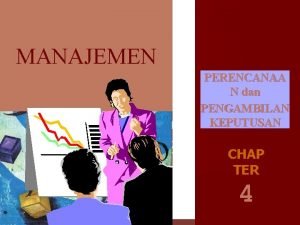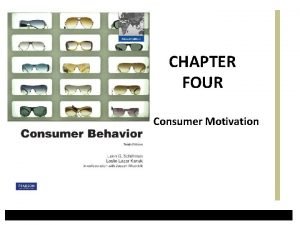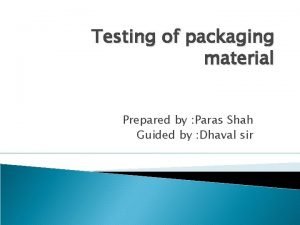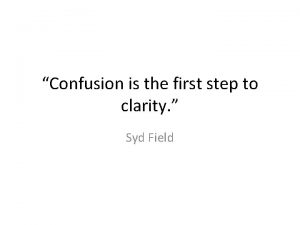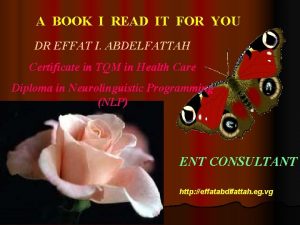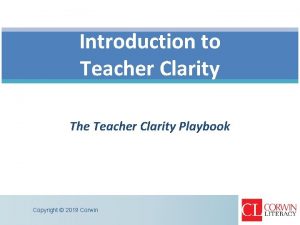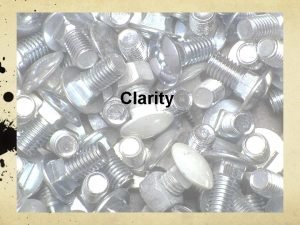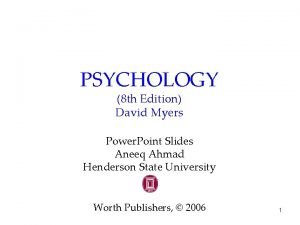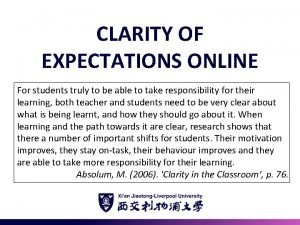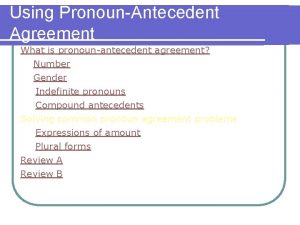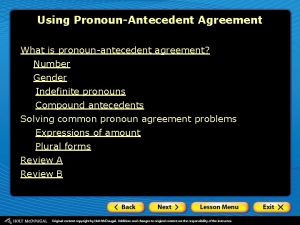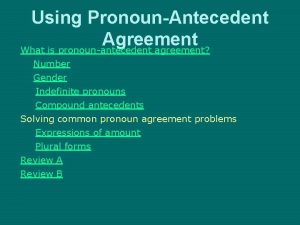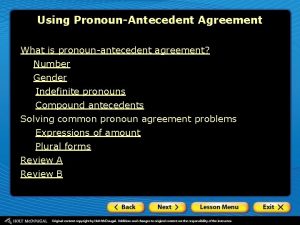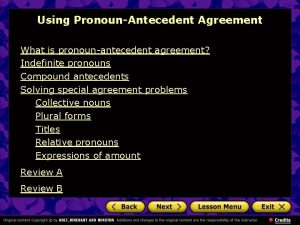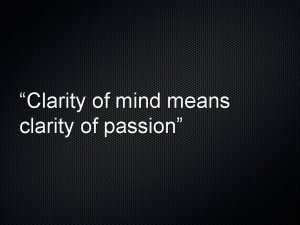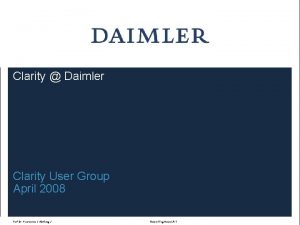3 1 16 Goals Understand pronounantecedent clarity Understand



















- Slides: 19

3 -1 -16 Goals: • Understand pronoun/antecedent clarity • Understand midterm grades • Evaluate thesis statements • Evaluate “Book” drafts • Read “The Terrible Old Man” and begin analysis

Pronoun - Used in place of one or more nouns Antecedent - word to which pronoun refers Personal pronouns, nominative case Possessive pronouns Person/number Singular Plural 1 st person I we 1 st person my, mine our, ours 2 nd person your, yours 3 rd person he, she, it they 3 rd person his, hers, its their, theirs Personal pronouns, objective case Reflexive/Intensive pronouns Person/number Singular Plural 1 st person me us 1 st person myself ourselves 2 nd person yourself yourselves 3 rd person him, her, it them 3 rd person himself, herself, itself themselves

Every pronoun should have a clear antecedent. An aspect of cruelty is shown when the mayor charged Maitre Hauchecorne on one man’s word who had a quarrel with Master Hauchecorne. An aspect of cruelty is shown when the mayor charged Maitre Hauchecorne on the word of one man who had a quarrel with Master Hauchecorne.

Every pronoun should have a clear antecedent. When Maitre Malandain gives evidence that Maitre Hauchecorne is a thief it exalts himself. When Maitre Malandain gives evidence that Maitre Hauchecorne is a thief he exalts himself. Maitre Malandain exalts himself when he gives evidence that Maitre Hauchecorne is a thief. Maitre Malandain exalts himself by giving evidence that Maitre Hauchecorne is a thief.

Every pronoun should have a clear antecedent. The people are “always in doubt for fear of being cheated. ” This shows that not only do they not trust one another, but they also are afraid of one another because of it. The people are “always in doubt for fear of being cheated, ” not only because they do not trust one another, but also because they are afraid of one another.

Every pronoun should have a clear antecedent. Maitre Hauchecorne protests the accusations exclaiming, “How can they tell such lies as that to slander an honest man! How can they? ” Maupassant reinforces this by saying, “His protestations were in vain; he was not believed. ” Maitre Hauchecorne protests the accusations exclaiming, “How can they tell such lies as that to slander an honest man! How can they? ” Yet the townspeople clearly can believe the lies, because Hauchecorne “was not believed. ”

Every pronoun should have a clear antecedent. According to previous years, it can easily be seen that the aspects of human nature have not changed very much. People always have and always will continue to place the blame on innocent people when in reality they had nothing to do with the situation in the first place. Over the centuries, human nature has not changed very much. People always have and always will continue to place blame on innocent people for all sorts of things.

Every pronoun should have a clear antecedent. Pride comes before many people’s fall. In Guy de Maupassant’s short story, “The Piece of String, ” Maitre Hauchecorne experiences this when he has too much pride to let people see him pick up a piece of string. Pride comes before many people’s fall. In Guy de Maupassant’s short story, “The Piece of String, ” Maitre Hauchecorne experiences such a fall when he has too much pride to let people see him pick up a piece of string.

Understanding your midterm grade Paper 1 x. 05 Paper 2 x. 10 Paper 3 x. 10 Paper 4 x. 15 Paper 5 x. 15 Paper 6 x. 15 Paper 7 x. 20 C = 75 x. 05 = 3. 75 B = 85 x. 10 = 8. 50 C+=78 x. 10 = ____ 7. 80 20. 05/ 25 = 79. 8 = 80%

Understanding your midterm grade Paper 1 x. 05 Paper 2 x. 10 Paper 3 x. 10 Paper 4 x. 15 Paper 5 x. 15 Paper 6 x. 15 Paper 7 x. 20 C = 75 x. 05 = 3. 75 B = 85 x. 10 = 8. 50 C+=78 x. 10 = 7. 80 C- =72 x. 15 = 10. 80 B =85 x. 15 = 12. 75 C+=78 x. 15 = 11. 70 D =65 x. 20 = 13. 00 ____ 68. 30 = D+ = U

Rate thesis statements. (5 = great, 3 = OK, 1 = weak) Guy de Maupassant’s “The Piece of String” reflects on loss, and how Maitre Hauchecorne suffers when he loses his credibility and pride. Guy de Maupassant’s “The Piece of String” reflects the sense of status, prideful, and hateful aspects of human nature by using imagery, brief incidents, and feelings between the characters. Guy de Maupassant’s “The Piece of String” reflects the character of individuals as an aspect of human nature. Guy de Maupassant’s “The Piece of String” focuses on a single aspect of human nature, shame.

Rate thesis statements. (5 = great, 3 = OK, 1 = weak) This story shows self-consciousness through Maitre Hauchecorne’s constant efforts to alter his community’s opinion of him. In “The Piece of String, Guy de Maupassant explains human nature through pride, gossip, and truth. The main aspects of human nature that coincide with each other in the story are revenge and forgiveness. Throughout the story, the most distinct human aspects shown are pride, anger, and deception. Pride and boastfulness are a dangerous combination that leads to one being made fun of and laughed at as will be seen later on in this essay.

For Tuesday: H. P. Lovecraft’s short story, “The Book, ” could be described as a “scary” story. In a paper no longer than two pages (using 12 -point Times New Roman font and following MLA format), explain some aspect of the story that makes it “scary. ” Swap “Book” papers with someone who has not yet swapped with you. Evaluate thesis: How well does it respond to the prompt? Evaluate each topic sentence: How well does each support thesis?

On your “Error” page, record your main errors from the “String” paper and the “Book” paper.


http: //www. dagonbytes. com/thelibrary/lovecraft/theterribleoldman. htm

For this assignment, you need to “explain some aspect of the story that makes it ‘scary. ’” Based on the group work last week, on your work for your “Book” paper, and on your reading of “The Terrible Old Man, ” create a list of aspects (or features, or characteristics) of “The Terrible Old Man” than make the story “scary. ”

INVENTION: In pairs or small groups, make a list of features or elements that make the story “scary. ” As you complete your list, write it on the board (but don’t repeat features already listed by someone else). ARRANGEMENT: Using the list on the board, look for pieces of evidence (in the story) to support different possible thesis statements, and generate a tentative thesis for your paper. Once you have a tentative thesis, read the story again, this time looking specifically for evidence to support your thesis. Using your tentative thesis, begin writing your paper. You might use an outline, you might start by putting your evidence into logical groups (for paragraphs), or you might simply write thesis and keep going. Generate at least a thesis and two body paragraphs for Tuesday’s class.

Schedule: Today: 3/1 Bring copy of “Book” paper for evaluation. Read “The Terrible Old Man. ” HW: Begin work on “Old Man” paper (Paper #4). Thursday: Bring “Old Man” work to class. 3/3 HW: Write complete draft of “Old Man” paper. Tuesday: Bring complete draft of “Old Man” paper. 3/8 HW: Revise “Old Man” paper; submit to turnitin. com. Thursday: Turn in “Old Man” paper. 3/10
 Strategic goals tactical goals operational goals
Strategic goals tactical goals operational goals Strategic goals tactical goals operational goals
Strategic goals tactical goals operational goals To understand recursion you must understand recursion
To understand recursion you must understand recursion General goals and specific goals
General goals and specific goals Motivation in consumer behaviour
Motivation in consumer behaviour Clarity of aqueous extract test
Clarity of aqueous extract test Confusion is the first step toward clarity
Confusion is the first step toward clarity Clarity
Clarity Clarity cll trial
Clarity cll trial Clarity through contrast worksheet
Clarity through contrast worksheet Teacher clarity playbook
Teacher clarity playbook Verb of clarity
Verb of clarity Relative height psychology
Relative height psychology Clarity chromatography software
Clarity chromatography software Clarity election night reporting
Clarity election night reporting Teacher clarity checklist
Teacher clarity checklist Open source mes software
Open source mes software Clarity of research
Clarity of research Sentence clarity exercises
Sentence clarity exercises Clarity technical writing
Clarity technical writing

